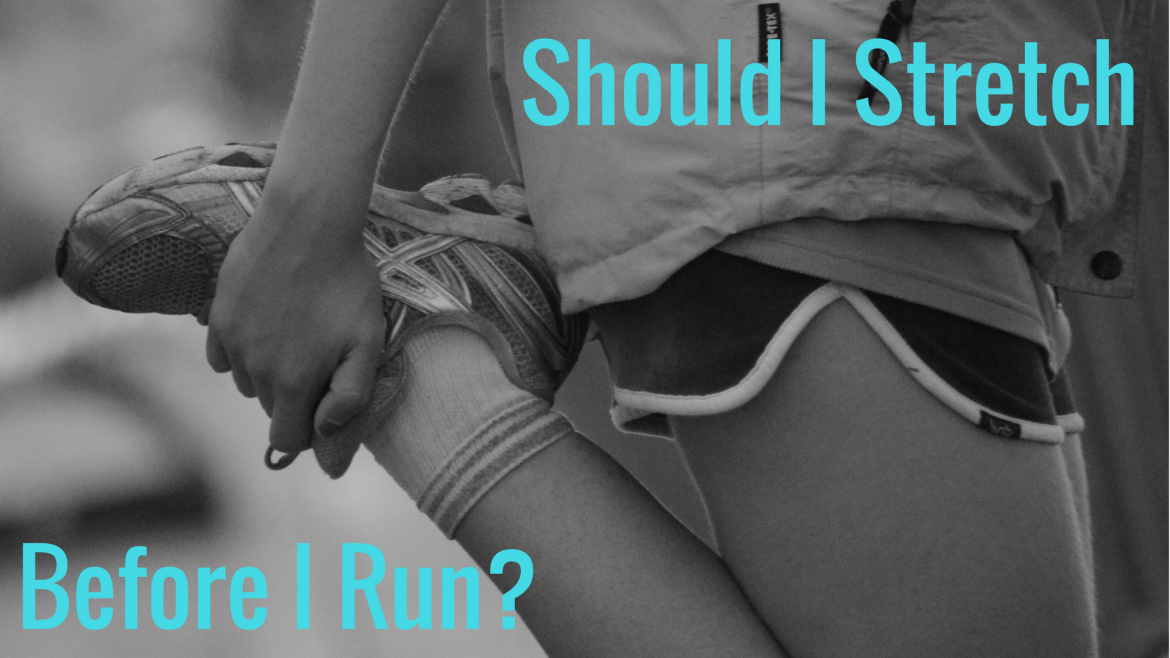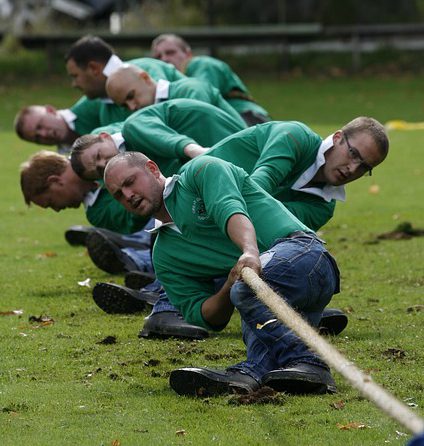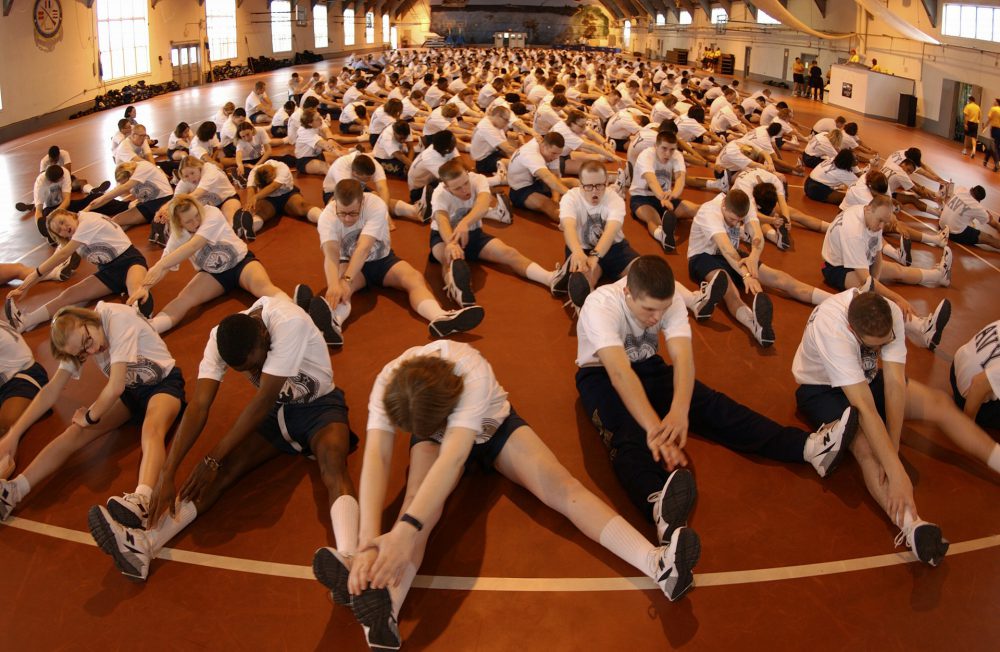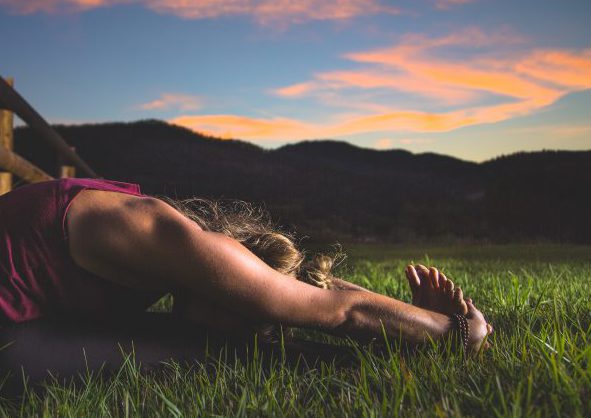I’m a stretcher.
I’ve always figured it’s doing me some good, and that if I keep at it I might someday magically be able to touch my toes.
But I’ve had a few nagging questions on my mind for a while as I’ve been dutifully stretching out.
Should I stretch before running? Does it prevent injuries? Does it make me more flexible? Are there any actual benefits to putting myself through this?
So I turned to the sciences to see what they say about stretching muscles before a run.
And, in the end, what I found out is that maybe it’s the mental muscle that’s getting the real stretch.
The Science Problem
There’s been a scientific food-fight raging over stretching for quite some time. Over the years, it’s produced a mountain of research.
Studies upon studies.
Studies of other studies.
Reviews of studies of other studies.
You would think that all that effort, all that work, all that paper would have produced something definitive. Something you can point to and say “yes stretching is good for you and here’s why”.
You would think so, right?
Nuh-uh.
Let’s start with the obvious thing that should be true…
Stretching Should Lengthen Muscles
I mean, you’re stretching them, so…they should get longer, right?
Aside from how devilishly hard it is to measure the length of muscles in living, breathing, human beings, studies have shown that stretching can lengthen muscle complexes temporarily – for anywhere from 90 minutes to 24 hours.
But I found only one study that proved that stretching lengthens muscles in any sort of permanent way.
Sort of.
It involved stretching a small set of muscles in the ankle. That’s it. Subjects stretched these muscles for 20 minutes a day, 5 days a week over a 6-week period. Scientists were able to accurately deduce (they weren’t able to directly measure) that the subjects’ muscle complexes got longer.
Proving that stretching can lengthen muscles.
Except…
Imagine yourself stretching out a tight hamstring – just one hamstring – for 20 minutes. Then the other hamstring for 20 minutes. Then maybe a calf muscle – 20 minutes.
That’s 3 muscles per hour.
A typical athlete stretches a single set of muscles for between 15 and 150 seconds a day. So, yes, if you had nothing else to do – like, for example the run that you were stretching for – stretching will make you more flexible.
The study also didn’t factor in what happens when you stop your stretching program (in favour of, for example, earning a living), which brings us to another, rather alarming, study that tried to answer that question.
In this one, scientists immobilized leg muscles in cats, in the shortened position, for a prolonged period of time. They found that the muscles actually did shorten (leaving the cats with, one can only imagine, at least one horrifically bent leg and a serious speed impediment). Fortunately when allowed to recover, the muscles returned to their normal length. But when the scientists immobilized cat muscles in the lengthened position for a prolonged period of time, the muscles did not actually lengthen.
Muscles want to be a certain length – the length that works best to shoulder the load they’re continually exposed to. They will lengthen for short periods of time to accommodate requests, but as for stretching turning you into a living Gumby? Sorry. Not happening.
Well, Does Stretching Reduce Injury?
I’ve always stretched out with the expectation that it’ll help me avoid yanking a muscle. But there’s just not a lot of scientific support for the idea that stretching reduces injury.
The most charitable study I could find in favour of stretching was actually a review of the conclusions of a number of studies. The review concluded that these other studies, if interpreted properly, point to a routine that would logically reduce injury. This routine would involve a brief warm-up, enough to get you into a mild sweat, followed by stretching, followed within 15 minutes by your workout. Following this type of pre-exercise stretching routine, the reviewer reasoned, would warm the muscles and provide greater range of motion around a joint – and so reduce the risk of injury. The study also concluded that three 30-second stretches of a muscle group once a week should improve flexibility.
As much as I want desperately to believe this (even with the ultra-minimal three-stretch-per-week claim), most studies have found that stretching before or after a workout does very little, if anything, to reduce injury.
One study of thousands of army recruits found no reduction in lower-limb injury with stretching before exercise.
The study also found that the two most important factors in lower-limb injury were age (injuries were about twice as likely at age 35 as at age 20), and how fit the candidates were – how well they did on the 20m shuttle run (beep) test.
So if you’re young, and fast, that will help you avoid injury.
As for counting on stretching to do that, well…maybe not so much.
But Are We More Flexible Than We Think?
Just when you’re about to give up on stretching altogether though, science tuns over another rock and finds something cool.
How flexible you are, may be more related to your tolerance for pain than whether or not you have “looser” muscles.
If you’re someone who can bend your fingers back past 90 degrees, or pull your thumb down so that it can touch your wrist, or you’re in Cirque du Soleil, you might qualify as having benign joint hypermobility syndrome (BJHS).
If this is you, your muscles have an advantage most other peoples’ don’t. The ability to bypass pain.
A study measured stretching in people with and without BJHS. It measured muscle size and length, the forces generated during stretching, the angles of stretch and a laundry-list of other factors as these two groups went through a series of highly-instrumented stretches.
The conclusion?
The muscles of super flexible people were no different, no smaller or larger or longer, than the control group of non-BJHS people. Not only that, but the resistive forces exerted by the muscles for a given angle of stretch – how much the muscle resisted stretching – were identical between the two groups. The BJHS people could stretch farther, but, all things being equal, the only difference between the two groups was their tolerance for stretching.
People with BJHS could stretch their muscles beyond the pain points of the other group without registering it. Most people’s muscles put a halt to things well before things looked, say, tense; super flexible people’s muscles say, effectively “no problem”.
Of course, super flexibility has pluses and minuses. It’s possible to overstretch and damage muscles if your body isn’t giving you the proper stop signals, hence BJHS is known as a condition. But your flexibility may well be more a function of your muscles’ ability to take the stretching than of anything else.
For stiff people like me, repeated stretching may just extend the end-point of our comfort zone. You’ll know this if you’ve ever stretched at least two sets in one session. The first set is always the toughest, the next one is a little easier and so on. You can generally get a deeper stretch with each progressive set.
So stretching does loosen things up temporarily (see above) – due, in no small part, to mental muscle.
Which brings us to one of the less-studied reasons to stretch before a run…
The Social Benefits of Stretching
With the physical sciences at loggerheads over whether stretching helps you at all, and before we pack up the entire idea of stretching before running, I thought we should grant a little air time to the social sciences. My observations may lack a mountain of research, but you tell me if they don’t make a strong case.
Let’s have a quick look at the social benefits of stretching before a run.
Social Benefit #1: Looking Smart.
Let’s take a standard running group – any group greater than one.
In this group, there will be an initiator; someone who says “I’m just going to stretch for a minute before we go, is that okay?”
Of course this is okay. In fact, the initiator will appear smarter, more thoughtful. Prudent. Just by virtue of her wanting to take a minute to stretch.
Have you ever heard any runner say in response to an initiator, “Oh, I don’t need to stretch” or “No thanks” or “Why? That’s pointless”.
Neither have I.
When an initiator says “I gotta stretch” every one nods and assumes their positions.
Which leads to…
Social Benefit #2: Getting Away with Unusual Poses in Public.
You can do almost anything in the name of stretching.
Lean against a lamp post like you’re trying to bend it. Peer at someone else upside down through your wide-apart legs. Put one leg up on a railing and bend over. Look like you’re posing for Yoga Weekly. All in public, with your lack of flexibility on full display.
Which leads also quickly, to…
Social Benefit #3: The Conversation Starter.
The pre-run stretch can provide an entire run’s worth of conversation fodder. Whether you’re discussing you, your partner, or someone else – the run is over before you know it.
So What to Do?
Should we stretch before running?
Some scientists say yes, some say no, most say it doesn’t make one bit of difference.
I say, absolutely.
We’ve been given the social liberty as runners to do pretty much anything in public in the name of stretching before we go for a run. We should take advantage.
I, for one though, won’t try to touch my toes.
Too embarrassing.
I’d love to hear your experiences with stretching, and any comments you want to share, below.




Stretching has always been enforced on me growing up for sports and what not. from little league baseball, to high school basketball. All practices and games wee started with stretches. Now that i do most of my workouts solo i do not stretch before workouts. I only stretch after workouts because it seems to help with soreness. But then again it depends on how stiff i’m feeling! Thanks for some solid insight on it though. Makes me feel a bit better about myself!!
You’re welcome Chris. I tend to stretch after workouts as well – as much for the psychological benefits as for anything. Good going. See you out there.
Hey Larry, I’m a huge believer of stretching after a workout, small warm up before starting and a few minutes stretching after the workout. I feel like my muscles do not feel sore if I stretch afterwards. Maybe it’s just me, but I have felt a huge difference between stretching and not stretching after a workout the next morning. Thanks for showing more light into this discussion.
You know, Victor, I feel the same way. A little stretching or warm-up ahead of time but most importantly a post-run stretch makes me feel fresher the next day. The science seems to say it could be all in my head, but whether it’s in my head or not, it works for me too. For me, that’s the way it works.
I hate to say it but I think stretching is a field in need of (god forbid) more study. 🙂
I’ve never liked stretching. It has always seemed like a chore without any benefits for me, especially after being forced to do it in grade school gym and when I ran for cross country. I’ve given up on it since 2004 and haven’t suffered any injuries even with lifting weights haha.
Occasionally I will stretch if I have a stiff muscle that is bothering me. That is the only time I have ever felt that it was a benefit.
I’ve read a lot of studies as well as you and based on my personal experience, came to the conclusion that it doesn’t provide any negatives or benefits. Somehow I can still stretch well past my toes. It seems that you may be onto something with everyone having their own comfort zone based on the currents needs of the activity.
Eris, first of all it’s great that you haven’t suffered any injuries since 2004. If we all could be so fortunate (smart?). 🙂
The stretcher part of me says It probably helps that you’re flexible – but the rational part says it doesn’t matter. Whatever you’re doing, keep it up!
And yes, I thought that study was interesting too – that a person’s ability to stretch might be as much in their mind as in their body. Obviously, you’ve got a more flexible mind than I have!
All the best! Keep on doing what you’re doing!
I am not a Stretcher!
I used to as a beginner but now I don’t. I haven’t for about 4 years and have only suffered very minor short lasting injuries. So For me I will keep on.
I don’t even warm up unless I am racing. I find an easy half mile as my first is all I need to get warm and stretched ready to up the pace.
But I also think its important We all do what is comfortable. Until Science shows stretching is inherently bad for you if you like it and its part of your routine, I say go for it. But if you just find it an embarrassing chore (me) Just get on with your run!
Well said Steve (until further scientific notice for both of us).
See you out there!
Hi, Great post. Valuable information with scientific evidence. I just start running slow as my warming-up. Would you think that’s ok as well? Because the muscles are getting warm, en more flexible right? I do my stretching after my run session. But nice move to trigger me by saying I’m going to be the smart guy 😉 I’ll try that.
I’m not an expert, NicoA, but one of the studies suggested that warming up beforehand would (theoretically) reduce the risk of injury – so I think you’re on the right track. Good on you for getting out there. That, ultimately, is what it’s all about! All the best!
Hello,
thank you for sharing a very interesting article about stretching before workout. I have to point out, you really explain in details everything we need to know about benefits of stretching. I didn’t know that stretching is so important and that it can help you to avoid injury.
Have a great day
Thanks Karlo. I’m not sure science is convinced that stretching will help you avoid running injury – but until they have some definitive proof, might as well stretch! Have a great day yourself.
Great article! I found it very informative and also a little confusing lol. Like you said, it is runny all of these studies have been done in the science world, and they still don’t have anything conclusive. With that being said I have always heard that stretching is beneficial before a workout. What are your thoughts on stretching before lifting weights?
My weight lifting consists of Tony Horton’s Power 90 – and he stretches before and after lifting, so I follow along. I’m not a weight lifter, really, so I haven’t looked into it John. But I haven’t blown anything out in about 10 years of Power 90, so something works. My approach to stretching is – I don’t know if it works, but I’ll keep stretching until convinced otherwise!
Thanks for the comment. All the best in your workout endeavours!
Hello there,
Loved your post, especially the end. I myself always stretch before I go running. I don’t know if it actually prevents injury, I just know I’ve been doing it since I remember. I think it’s also part of preparing yourself for a physical effort mentally. By stretching you’re kind of getting ready and focusing on the fact that you’ll go running now and it helps you run easier, if not physically it helps mentally. My 2 cents on the topic. So YES, stretch!
I’m with you Dejan. It really is a psychological preparation to get you in the running frame of mind. Like a ritual almost for a lot of us. Great 2 cents! Keep on keeping on!
I have to agree with you. I absolutely believe you should stretch before any exercise. Most importantly running. I think it gets your muscles ready. I know that stretching in some sports is something you have to do. I did gymnastics, and my son did gymnastics for 13 years. Any injury I ever had or he has, is usually due to not stretching properly, or of course too much pounding on the joints. So, I think we all need to stretch before any work out !
Thanks for the comment, and intuitively, I agree Matt’s Mom. Maybe the science just hasn’t caught up to what we all sort of know – don’t know why they haven’t been able to prove conclusively it reduces running injuries. Stay healthy and keep on stretching!